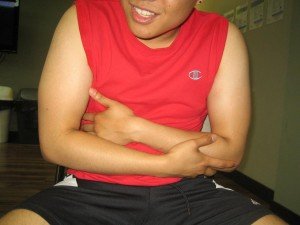Chronic stomach ache after eating can indicate irritable bowel syndrome. This is a usual digestive issue that usually affects the large intestines or colon. Even though irritable bowel syndrome could not be treated, you can learn how to minimize the symptoms with changes in the lifestyle and the diet. The doctor must be consulted so that ways to effectively manage the condition can be recommended. Always remember that chronic stomach ache can be linked to another condition and must be diagnosed with the symptoms. If you want to learn the appropriate measures in managing this condition, read here.
What is irritable bowel syndrome?
This condition can develop at any age but quite common in early adulthood. The factors that can instigate an episode of irritable bowel syndrome include certain medications, foods and even stress that could not be properly managed.

The large intestine is connected to the brain and can be triggered by the nervous system and not an issue linked with the structure of the intestines. Those who have the condition usually develop chronic constipation and diarrhea. The bowels react in an inconsistent manner and can be overwhelming at some times. Take note that irritable bowel syndrome will not cause any lasting effects on the digestive tract.
What are the symptoms?
The symptoms linked to irritable bowel syndrome tend to vary from one individual to another and can be mild or severe. It is vital that the individual will monitor the symptoms so that they can be discussed with the doctor during the consultation.
The usual symptoms of irritable bowel syndrome include cramping, chronic stomach pain, diarrhea, gas, mucus in the stool, constipation and bloating. If the symptoms are mild, they can be managed by observing the conditions that instigate the symptoms. In case the symptoms become unbearable, a doctor must be consulted.
What is a detection diet?
In most cases, the doctor will recommend that the individual will undergo a detection diet. The detection diet will help identify the foods that are responsible for causing the symptoms that will develop. A detection diet is not intended to diagnose a condition but to pinpoint the foods that instigate the symptoms.
All suspected foods must be eliminated from the diet for up to two weeks. Each food must be slowly reintroduced in small portions and list down any reactions that will be experienced. At the end of the re-introduction period, the findings must be discussed with a doctor.
Considerations to bear in mind
If the individual develops chronic diarrhea along with the chronic stomach ache, there are precautionary steps to observe to prevent dehydration. Take note that chronic diarrhea can lead to complications such as weight loss and malnourishment. If the diarrhea could not be controlled with the diet, a doctor must be consulted regarding possible medications and other treatment options.
